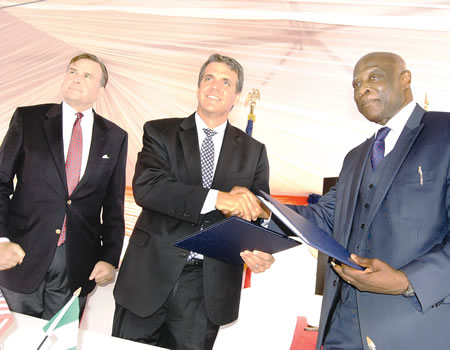
Recently, the US Trade and Development Agency (USTDA) announced its intervention in the establishment of a modular refinery on Tomaro Island in Lagos. In this report, OLATUNDE DODONDAWA examines it’s impact in the downstream sector as the nation moves towards attaining self-sufficiency in 2019.
When the Minister of State for Petroleum, Dr Ibe Kachikwu, earlier stated that he would ensure that the nation attains self sufficiency in refining of petroleum products by 2019, or else he would resign, many might considered that to be a political statement. However, whether it is a political statement or not, there are strong indications that the government is leaving no stone unturned until this is achieved.
Besides the Dangote refinery which is expected to come on stream by 2019, the United States Trade and Development Agency (USTDA) has decided to incentivise an indigenous firm’s efforts and stimulate infrastructure support that will help Nigeria, not only to meet the target set for herself in petroleum products refining, but also assume a net exporter of refined products.
It is important to state that the Department of Petroleum Resources (DPR) has issued licences to about 25 investors to build modular and conventional refineries with capacity to process about 1.429 million barrels per day.
Also, nine companies have submitted bids for co-location of new refineries within the complexes of Nigeria’s three existing refineries in Kaduna, Warri and Port Harcourt, which are expected to increase the nation’s refining capacity from 445,000 bpd to 650,000bpd, all in a bid to achieve the target.
Specifically, a list of current private refinery’s licensees posted on DPR website showed that about 25 companies have signified interest to build refineries with capacities ranging from 5,000bpd to 500,000bpd.
These refineries, when completed, are expected to produce Premium Motor Spirit (PMS), House Hold Kerosene (HHK), Low Pour Fuel Oil (LPFO)) and Automotive Gas Oil (AGO), currently being imported into the country.
Some of the companies issued licences include Dangote Oil Refinery Company with capacity to produce 500,000bpd; Resource Petroleum & Petrochemicals International Incorporated, 100,000bpd; Hi Rev oil Limited, 50,000bpd; Aiteo Energy Resources Limited, 100,000bpd; Epic Refinery and Petrochemical Industries Limited, 107,000bpd; Petrolex Oil and Gas Limited, 107,000bpd; and Eko Petrochem and Refining Company Limited with capacity to produce 20,000bpd.
Others are Capital Oil and Gas Limited, 100,000bpd; Master Energy Oil and Gas Limited, 30,000bpd; Kainji Resources Limited, 24,000bpd; Cross Country Oil and Gas Limited, 20,000bpd and Waltersmith Refining and Petrochemical Company limited with capacity to produce 5,000bpd. According to the DPR, the licensed refineries are at different stages of their projects.
There are few examples of licensees who have made some efforts to commence activities.For instance, the fabricated process units of the 12,000bpd Amakpe International Refinery Incorporated have already been inspected and certified but have not been shipped to Nigeria.
Resource Petroleum and Petrochemicals International Incorporated has signed a contract with Foster Wheeler France and Axens for Front End Engineering Design (FEED) while detailed engineering approval has been granted to Hi Rev Oil Limited and Azikel Petroleum Limited to produce 50,000bpd and 12,000bpd of petroleum products respectively. However, about 19 projects of the companies granted licences are yet to commence.
The signing of a Memorandum of Understanding (MOU) between USTDA and Eko Petrochem in Lagos at the weekend was the highlight of negotiations for technical partnership and funding by the indigenous oil firm.
The partnership involves a seed fund of about $1 million grant to the company by USTDA after the selection of Texas based VFuels to carry out the study which will provide technical analysis, engineering and design needed to advance the 20,000 barrels per day modular refinery.
The refinery is expected to promote infrastructure development by increasing Nigeria’s local refining capacity. The event affirms Petrochem’s desire to fully bring the project into production within the timeline set for commencement of operations.
Kachikwu who was in high spirit and elated on the USTDA intervention urged management of Eko Petrochem to double efforts to bring the refinery into full production bearing in mind that he has staked his position as a minister to resign if he fails to achieve the 2019 deadline to end product importation.
Kachikwu who was represented by Mr Rabiu Suleiman, Executive Director, Downstream, NNPC, said “I will resign if I fail to meet the target and I stand on my words, but I am proud and emboldened with some of these projects coming into realisation.”
Kachikwu said he was particularly elated by the significant interest displayed by the US government to support Federal Government’s vision of attaining self sufficiency in petroleum products refining. He promised to give all needed support to see to the actualisation of the project.
The minister said about 33 licenses have been issued but the operators have not demonstrated commitment to take off except Integrated oil and gas and appreciated the level of support offered by the US government.
Speaking during the signing of an MoU, Acting Director of USTDA, Thomas Hardy, said “We are proud to support this new project which will lead to infrastructure development and economic growth in Nigeria. This project represents an excellent opportunity for US businesses to export technologies and services in support of Nigeria’s refining goals.”
In his remarks, Chairman of Eko Petrochem and Refining Company, Capt Emmanuel Iheanacho, said “We appreciate USTDA supporting our company’s infrastructure development plan, adding that the funds received will help ensure timely completion of the proposed development and the attainment of the underlying economic and social impacts envisaged.
“Today, we are celebrating the signing of the grant award agreement to be executed by the USTDA and Eko Petrochem and Refining Company. Also, we gather to mark the formal inauguration of our Tomaro Island Industrial Development Scheme, as Tomaro Industrial Park, with free trade zone status.
“Regarding the USTDA cash award, it would be recalled that the Genesis/IOG Group had initiated designs to steer the country away from the wasteful historical practice whereby the country exclusively sold its crude oil exports on an FOB basis and procured its refine products for domestic consumption on a CIF basis. The group put forward a proposal for the private sector development of a 20,000 bpd refinery on Tomaro island;” Iheanacho explained.
He said the US government acting through the USTDA has accelerated the process of the planned economic investments through the industrial development grant, in the sum of $797,343 which it has deemed fit to bestow on the company, which is the first tranche of the $1 million seed grant.
Iheanacho described the grant as the first of its kind, as it is the first offshore grant to the project and which is a critical validation of the company’s business efforts and direction.
In his speech, the US Ambassador to Nigeria, Stuart Symington, assured of the US government continued support towards growing Nigeria’s economy.
Symington said the oil and gas sector is strategic to Nigeria and it is the desire of his government to support local capacity in developing the right infrastructure that will add value to the system especially partnerships that will help deliver local partnerships.
The envoy also challenged Nigerians to develop interest in investing in the economy as such would help empower local entrepreneurs, create jobs and facilitate economic development. He commended Integrated Oil and Gas for the initiative to support efforts of the government in bridging infrastructure gap in the sector and in particular adding value through local refining of crude oil.
On his part, representative of VFuels, SouheilAbboud, said, “VFuels is proud to partner with USTDA to further develop the Eko Petrochem Refinery. We believe very strongly in our commitment to serving the Nigerian people and are enthusiastic that the USTDA shares same vision and commitment. Eko Petrochem will be a model for those looking to improve Nigeria’s local refining capacity and will contribute to the growing demand for fuels and electricity”.
Conclusion
Stakeholders in the Nigeria’s downstream sector urged the Federal Government to provide enabling and level playing environment for serious investors in order to liberate the sector. Speaking in an interview with the Nigerian Tribune on the sideline of the event, the Chairman, Integrated Oil and Gas Limited, Capt. Emmanuel Iheanacho, said the Federal Government should provide an enabling environment for entrepreneurs to establish modular refineries, so as to meet the nation’s refining capacity. Iheanacho, whose parent company is promoterror of the 20,000 barrels modular refinery located in Tomaro Island in Lagos State spoke against the backdrop of government’s frequent importation of refined petroleum products into the country.
According to him, “Federal Government must formulate a policy framework that will compel financial institutions to make funds available to indigenous players that intend to build refineries.
Iheanacho appealed to Federal Government to support indigenous oil companies which are striving to grow the oil and gas sector, adding that government should also support local companies with funding.
“We are in absolute support of growing indigenous capacity in every facet of our oil and gas industry. This is because the local companies are paying their taxes, reinvesting their capital and creating enormous job opportunities for the larger community,” he stated.
He pointed out that with such encouragement, Nigeria’s participation in the industry would rise significantly in line with government’s aspirations with the Nigerian Content Act. “Financial support is one major area we need government’s help if government realises that there is need to have a lot of the small scale refineries to turn around the economy. We can now start exporting refined products than we are currently importing. The government should make provision for financing because it is a key requirement to do 20,000 barrels per day.
“We need government to assist modular refinery operators. We are not asking to be given grants and handout but to be assisted in the process of being able to secure financing in major finance institutions,” he said.
Iheanacho also explained that if the government could assist the operators to secure finance, it would go a long way to assist them to realise some of the benefits that would drive the country’s economic growth. According to him, his $116 million proposed refinery would be a reference point in Nigeria when completed.
He added that the 20,000 barrel per day (b/d) refinery was coming at a period when stakeholders have faulted the move by the government to co-locate refineries and rather advised them to give support to holders of modular refinery licenses.
According to him, “the Tomaro refinery sited on a 90-hectare land in AmuwoOdofin Local council area was expected to begin production with Automated Gas Oil (AGO) known as diesel, Dual Purpose Kerosene (DPK), export quality aviation fuel, Naphtha and fuel oil.
He said that the plant would be upgraded to produce Premium Motor Spirit (PMS) also known as petrol, as operations progressed. He said the facility is designed as a one-stop shop to comprise refinery plant, storage facility, flour mill, ship repair yard, a helipad for aviation operations to offshore platforms and resort centres. He said the project would also create massive employment for the teeming youths of the country.
WATCH TOP VIDEOS FROM NIGERIAN TRIBUNE TV
- Let’s Talk About SELF-AWARENESS
- Is Your Confidence Mistaken for Pride? Let’s talk about it
- Is Etiquette About Perfection…Or Just Not Being Rude?
- Top Psychologist Reveal 3 Signs You’re Struggling With Imposter Syndrome
- Do You Pick Up Work-Related Calls at Midnight or Never? Let’s Talk About Boundaries





